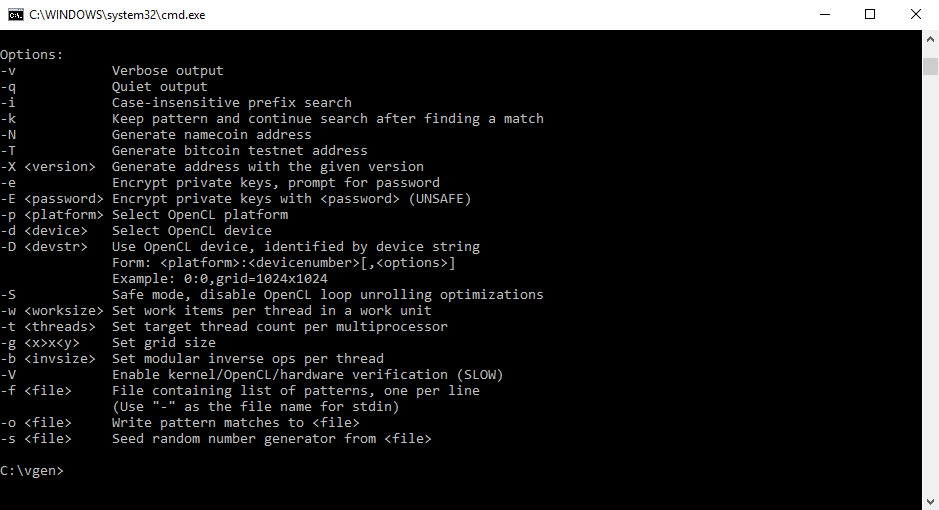Vanity Address
Bitcoin addresses are identifiers using alphanumeric characters that aren’t always recognisable at first glance. To encourage public acceptance, we should facilitate whatever can be facilitated.

Bitcoin addresses are identifiers using alphanumeric characters that aren’t always recognisable at first glance. To encourage public acceptance, we should facilitate whatever can be facilitated.

Moreover, the vision of this sequence of numbers and letters can be strongly repulsive for people with no knowledge of cryptography. Generating your own address through Vanity is not really complicated and even fun. That’s why you have to do this yourself rather than using a third-party service. The main reason is always the same. For one trusted site you will find nine who will try to rip you off. So if you do not believe that you have sufficient knowledge to detect a scam, it would be best to go back.
Scam sites offer you to enter a string of characters and run the tests to find an address with a shape of the desired character string. For example, you want your address to start by 1Bet because you have a betting site. The site gives you
1Betx42BCrgrt56fgFrgkr4dfXer3gmIEf and the private keys of this address!
Then, the public address and its private key will be registered in their database of the site and therefore will have an instant access to your funds! Your Bitcoins will be in danger if you import the given address on your Bitcoin wallet.
The safe way to use vanity is to use the Vanity open source software and its command line. For more information, please take a look here: https://en.bitcoin.it/wiki/Vanitygen
First important thing, Vanity works only with existing bitcoin wallets. If you don’t have one yet, it’s time to take the big step forwards.
If you have one, run your command line.Vanitygen takes as input data from the model or model list, after which it takes address options and private keys. Vanitygen selection is based on probabilistic research, which takes a certain amount of time. The time depends on the complexity of the model setpoint, the speed of your computer and your luck.
Then, you are able to tape your pattern. In your example it is 1Bet. It should be noted that in the line you can not use 0 (zero), O (large o), I (large i), l (small L), and it must start with 1 (one unit).
Once your pattern is entered as input data, Vanity start his search. Please note that it’s probably not worth looking for long strings, in order to shorten processing times. The final result will be something like this:
Difficulty: 43891
Pattern: 1Bet
Address: 1Betx42BCrgrt56fgFrgkr4dfXer3gmIEf
Privkey: 5KBL5J2SCzoxCu8LSbur3vCcpzQQ5kL2JdRZDAu4AmCohko7goG
(Note that an ‘easy’ string to find like this does not mean that specific private key can be guessed easily .)
Vanitygen is a command-line vanity bitcoin address generator.
If you're tired of the random, cryptic addresses generated by regular bitcoin clients, you can use vanitygen to create a more personalized address. Add unique flair when you tell people to send bitcoins to 1stDownqyMHHqnDPRSfiZ5GXJ8Gk9dbjO. Alternatively, vanitygen can be used to generate random addresses offline.

Vanitygen accepts as input a pattern, or list of patterns to search for, and produces a list of addresses and private keys. Vanitygen's search is probabilistic, and the amount of time required to find a given pattern depends on how complex the pattern is, the speed of your computer, and whether you get lucky.
The example below illustrates a session of vanitygen. It is typical, and takes about 10 sec to finish, using a Core 2 Duo E6600 CPU on x86-64 Linux:
$ ./vanitygen 1Boat
Difficulty: 4476342
Pattern: 1Boat
Address: 1BoatSLRHtKNngkdXEeobR76b53LETtpyT
Privkey: 5J4XJRyLVgzbXEgh8VNi4qovLzxRftzMd8a18KkdXv4EqAwX3tSVanitygen includes components to perform address searching on your CPU (vanitygen) and your OpenCL-compatible GPU (oclvanitygen). Both can be built from source, and both are included in the Windows binary package.
Current vanitygen version: 0.21
 https://github.com/samr7/vanitygen
https://github.com/samr7/vanitygen
Windows x86+x64 binaries here.
Get the source from includes Makefiles for Linux and Mac OS X.
Main discussion at Bitcointalk
Using vanitygen you might think that you would be able to find the private key for a given address. In practice, this is considered impossible. Given that the difficulty increases exponentially the longer your vanity is, so does the average time required to find that vanity. The example table below shows how an increasingly complex vanity affects the difficulty and average time required to find a match only for that vanity, let alone the full address, for a machine capable of looking through 1 million keys per second.
| vanity | difficulty | average time |
|---|---|---|
| 1B | 22 | < 1s |
| 1Bi | 1,330 | < 1s |
| 1Bit | 77,178 | < 1s |
| 1Bitc | 4,476,342 (4.48E+6) | < 10s |
| 1Bitco | 259,627,881 (2.6E+8) | 3 minutes |
| 1Bitcoi | 15,058,417,127 (1.506E+10) | 3 hours |
| 1Bitcoin | 8.7339E+11 | 1 week |
| 1BitcoinE | 5.0657E+13 | 1 year |
| 1BitcoinEa | 2.9381E+15 | 60 years |
| 1BitcoinEat | 1.7041E+17 | 3,500 years |
| 1BitcoinEate | 9.8837E+18 | 200,000 years |
| 1BitcoinEater | 5.7325E+20 | 11,700,000 years |
| 1BitcoinEaterAddressDontSend | 1.6209E+47 | 3.3E+33 or 3.3 decillion years. |
Nice try to get Bitcoins from 1BitcoinEaterAddressDontSendf59kuE